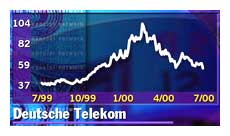|
DTel dials up VoiceStream
|
 |
July 24, 2000: 7:45 p.m. ET
German firm to acquire U.S. wireless co. for $46B; both stocks fall sharply
|
NEW YORK (CNNfn) - Ignoring direct threats from U.S. legislators to block any such deal, Germany's Deutsche Telekom AG agreed to acquire U.S. mobile phone operator VoiceStream Wireless Corp. for $46.04 billion in cash and stock, acting on a long-stated goal to extend its reach onto American soil.
The deal, agreed to late Sunday, would create a powerful international wireless concern with roughly 19.8 million wireless worldwide subscribers, including 1.8 million in the United States, and licenses to provide services to roughly 375 million people around the globe. It also marks the first phase of Deutsche Telekom's plan to become a significant participant in the U.S. telecommunications industry.
|

|
VIDEO
|
|
 CNNfn's Charles Hudson reports on the deal.
CNNfn's Charles Hudson reports on the deal.
|
|
Real
|
28K
|
80K
|
|
Windows Media
|
28K
|
80K
|
|
""There are five reasons for this deal: the right market, the right company, the right growth prospects, the right management and the right price," said Ron Sommer, Deutsche Telekom's chairman and chief executive officer. "I've always said we need to be a global player in all four aspects of our business. Now we've achieved this in mobile through the deal with VoiceStream. We will build on this position aggressively"
"They are now on par with the other two or three big [wireless] players in the world, those being Vodafone Airtouch and France Telecom's Orange Group," said Jeffrey Hines, an analyst with Deutsche Banc Alex Brown. "And unlike France Telecom and Vodafone, they would be the only ones with a significant presence in the United States."
Two-step deal
The deal is structured as a two-step process whereby Deutsche Telekom, Germany's largest company by market value, will provide an immediate $5 billion cash infusion to allow the Bellevue, Wash.-based company to compete for dozens of U.S. wireless licenses being made available via auction this fall.
In return for that investment, Deutsche Telekom will receive VoiceStream preferred securities convertible into common stock at $160 per share.
The second phase of the agreement calls for Deutsche Telekom (DT: Research, Estimates) to exchange 3.2 shares of its stock and $30 cash for each VoiceStream (VSTR: Research, Estimates) share, valuing the U.S. company at $174 a share -- a 16 percent premium above VoiceStream's closing price Friday. Deutsche Telekom will also assume about $5 billion in VoiceStream debt.
 When announced early Monday, the deal actually valued each VoiceStream share at $194.80 per share, a 30 percent premium to its closing price Friday. But both VoiceStream and Deutsche Telekom shares fell sharply Monday, shedding roughly $5 billion, or 10 percent, off the deal's value. When announced early Monday, the deal actually valued each VoiceStream share at $194.80 per share, a 30 percent premium to its closing price Friday. But both VoiceStream and Deutsche Telekom shares fell sharply Monday, shedding roughly $5 billion, or 10 percent, off the deal's value.
The deal carries a $1 billion break-up fee, but no price protection, or collar, should Deutsche Telekom's stock fall dramatically, a company spokesman said.
VoiceStream Chairman and CEO John Stanton said a collar limits the upside of the deal. (425K WAV or 425K AIFF) However, VoiceStream shareholders can elect to receive $200 per share in cash or 3.7647 Deutsche Telekom ordinary shares in lieu of the cash/stock combination.
Company officials expect the deal to take roughly nine months to complete, primarily because of a hard line drawn by a handful of U.S. legislators, who oppose Deutsche Telekom entering the U.S. telecom market.
U.S. legislators move to block deal
Sen. Ernest Hollings, D-S.C., has introduced legislation now pending in Congress that would prohibit the Federal Communications Commission from permitting the transfer of American wireless licenses to Deutsche Telekom or any other German firm for at least a year.
Hollings, the ranking Democrat on the Senate Commerce Committee, has cited national security concerns for his proposal, noting that Deutsche Telekom is 57 percent owned by Germany's government.
The legislation would require the German state to reduce its holding to 25 percent before the deal could be approved. As it now stands, Germany's government would own roughly 45 percent of the enlarged company once the deal is completed.
"I'm confident that the administration in the United States, Europe and Germany looks at globalization as a two-way street," Sommer said. "Germany is a country that surprised the world by its openness since 1998. The German government made clear they will continue to reduce the stake. Everybody who really knows the truth about the German market, it should not be an issue."
Analysts have repeatedly indicated that implementation of such a law was unlikely, given the United States' push in recent years to open overseas borders for its companies. However, analysts acknowledge the resistance could stall or threaten the deal.
"You don't have lightweights that are definitely opposed to [the merger]" in the U.S. Senate, noted Christopher Larsen, an analyst with Prudential Securities. "One of the nice things this morning is the [European Union] weighed in and said there could be major trade restrictions if the U.S. blocked it."
"If the merger were a national security problem, [the legislation] would be enough to kill it," Larsen added. "However, I'm not sure there is all that much national security going on with a wireless phone system."
"I think a lot of it is just politicians playing politics in an election year, but at the end of the day I think you'll see the deal go through," Hines agreed. "This is the year 2000 and that means we live in a global telecommunications industry. So if the United States wants to participate in that, then they'll let this deal go through."
Indeed, the Clinton administration declared Hollings' legislation "unnecessary" Monday. The European Union also attacked the proposed law, noting it would set a "negative precedent" that would contradict previous open trade commitments made by the United States.
Stanton said his company has not has a chance to tell its side of the deal and it intends to immediately in Washington. (445K WAV or 445K AIFF)
 Still, investors were clearly nervous. VoiceStream shares fell rapidly Monday, more than giving back the forward momentum it built last week after word of the possible deal first surfaced. The stock shed 19-3/4, or more than 13 percent, to close at 130. Still, investors were clearly nervous. VoiceStream shares fell rapidly Monday, more than giving back the forward momentum it built last week after word of the possible deal first surfaced. The stock shed 19-3/4, or more than 13 percent, to close at 130.
Deutsche Telekom's stock (FDTE), which fell steadily last week on concerns the proposed agreement was too expensive, continued its descent as well. In Frankfurt, the stock lost nearly 8 percent of its value to  50.65, while its American depositary receipts fell 6-1/2 to 45 on the New York Stock Exchange. 50.65, while its American depositary receipts fell 6-1/2 to 45 on the New York Stock Exchange.
The sharp declines confused analysts, who largely praised the deal and its price.
"This is a very reasonable price for DT to pay given that this makes them a global player," Hines said.
A history of failed deals
Deutsche is Europe's largest telecom firm by revenue. Its previous attempts to grab a share of the U.S. market have ended in failure, notably talks earlier this year with Qwest Communications International Inc (Q: Research, Estimates).
Deutsche's international joint venture with Sprint and France Telecom SA (PFTE) also collapsed in acrimony. Deutsche has made successful inroads into other European markets however, including the purchase of One2One, Britain's fourth-largest cellular provider.
When the terms of the VoiceStream deal first surfaced last Wednesday in The Wall Street Journal, the merger valued the No. 2 U.S. independent wireless concern at roughly $53 billion, or $205.60 per share, a 41 percent premium above VoiceStream's closing price of 145-1/2 that day.
That price has come down rapidly as both companies' stocks declined. However, the slide reflects the huge price Telekom is being forced to pay: the deal values VoiceStream subscribers at around $20,000 each, whereas previous deals in the sector have valued subscribers at some $6,000 each.
Quenching its thirst for a U.S. presence
Deutsche Telekom has long stated its desire to buy its way into the U.S. telecommunications market and has amassed a $100 billion war chest to help accelerate those efforts.
Until recently, analysts had pegged Sprint Corp. (FON: Research, Estimates) as the German firm's most likely acquisition target, particularly after Sprint's $117 billion merger with Worldcom (WCOM: Research, Estimates) started meeting regulatory resistance earlier this year.
Unlike VoiceStream, Sprint would have provided Deutsche with both a rapidly growing wireless operation and significant traditional telephone assets.
But VoiceStream, the No. 2 U.S. independent wireless firm behind Nextel Communications (NXTL: Research, Estimates), offered two significant advantages to Deutsche Telekom, analysts said: a cheaper price and its use of GSM technology, the digital mobile phone standard used throughout Europe and large parts of Asia and Africa.
"American consumers will see an acceleration in the rollout of state-of-the-art GSM technology," Sommer said. "More Americans will be able to have one phone, with one number, that they can use virtually anywhere in the world -- whether they are in Minneapolis, Munich or Melbourne."
Stanton will remain with the combined company and oversee Deutsche Telekom's new U.S. wireless operations.
VoiceStream's largest shareholders have agreed to the deal: Hong Kong conglomerate Hutchison Whampoa Ltd. owns a 23 percent stake, and Finland's Sonera has an 8 percent holding. Sonera said it would sell the Deutsche Telekom shares it would end up owning.
Goldman Sachs advised VoiceStream during negotiations, while Donaldson, Lufkin & Jenrette and Dresdner Kleinwort Benson represented Deutsche Telekom. 
|
|
|
|
|
 |

|

